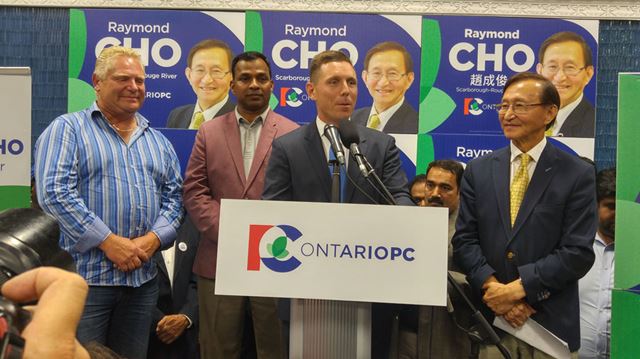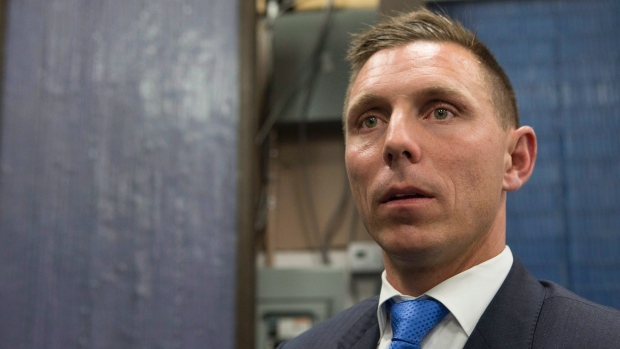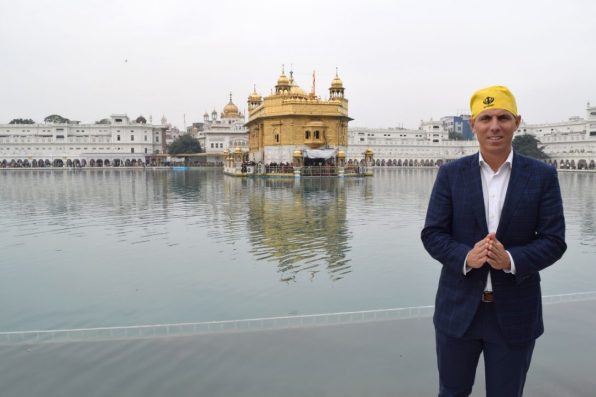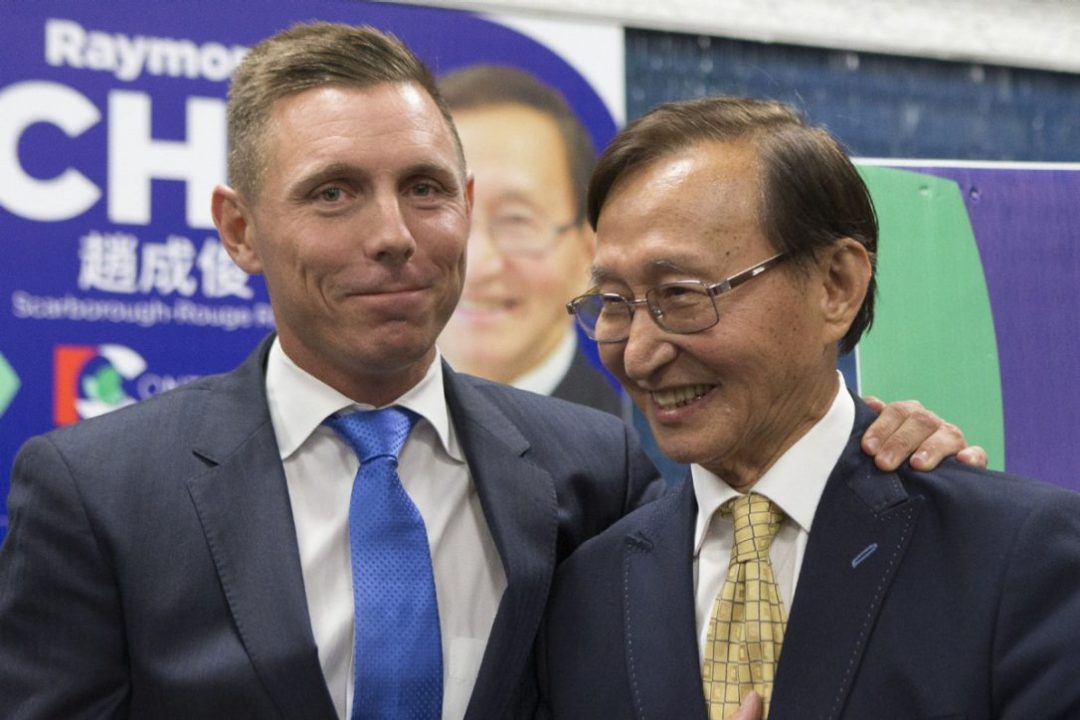By Richard Forbes.
Featured Image via Chris Young, CP.
Ontario’s Progressive Conservatives saw their first victory under new leader Patrick Brown this past week in a by-election in Scarborough–Rouge River. But at what cost?
Raymond Cho arrives late in the evening to his campaign office, formerly known as Babhi’s Beauty Salon (“Hair and Skin Care for Ladies.”) of 20 Nugget Avenue, Unit #6. Cho, now in his eighties, had just been crowned the victor of the Scarborough–Rouge River by-election.
By that time that night, the crowded little commercial unit, transformed by celebration and unadulterated celebration, is a raucous and diverse mosh of supporters, rubbing each other shoulder-to-shoulder to greet Cho at the door. At the backdrop stands Patrick Brown, brimming the most subdued of half-smiles and his campaign co-chair Doug Ford, who contemplates to himself running for something, somewhere in quiet rumination.
“Yaaaaaaay Patrick,” a woman screams, followed by a loud chant of “Patrick! Patrick!”
Stumbling through the throng of people towards the display wall, Cho greets supporters with a wide smile, almost violently shaken from the hugs and imposing well wishes.
“Boy does it feel good to be a Conservative tonight,” Brown says with some braggadocio.
In most cases, the election of a senior citizen, who’s run as just about everything – NDP, “Independent” Liberal, PC – in a by-election against a beleaguered government would not be newsworthy. Most by-election results can simply be dismissed as protest votes against the government (the Ontario Liberals, for example, have lost their fair share of by-elections running up to general elections they’ve won solidly,) but the circumstances leading up to this by-election raised expectations higher for both parties.
There was a real sense, rightly or wrongly, leading up to this by-election that the riding was in play for both the Liberals and the Conservatives. Although thirteen years in office would tar most governments from winning a by-election, Scarborough–Rouge River had been a Liberal stronghold long before this by-election. The polls were also close enough too: Forum polling had PC-OLP tied at 36%, while Mainstreet only had the PCs edging the OLP out 41-36%. But the eventual by-election results, which suffered from a poor turnout (28%), had the PCs capturing 39% of the vote against the OLP at 30%.

Perhaps it’s simply the political gods smiling upon poor Patrick Brown. His own clumsy damage control – making its way across the province like a roller derby of a thousand drunk Octopuses – which had many fearing the worst for his chances as premier, handicapped his party’s chances in Scarborough just enough that his victory in Rouge River is now worth celebrating. Whether serendipity, strategy or just dumb luck, if the rookie leader hadn’t been caught with his pants down (figuratively speaking), it’s unlikely there would have been such low expectations for a PC win in Scarborough.
Brown’s troubles began when Cho’s campaign sent out fliers that suggested the PCs would drop controversial Liberal changes to the sex-ed curriculum. That curriculum, which had been updated by the Liberals to incorporate LGBT subjects, has become a lightning rod of sorts in some ethnic and ultra-religious communities concerned their children (if the government has its way) may know how to practice consent and safe gay sex, among a litany of other concerns only vaguely related to the actual content of the update.
As one of the few decisions of Wynne’s Liberals to not receive a damaging reception from voters as of late, picking on the sex-ed curriculum of all things seemed a shrewd choice. The letter was slammed as bigotry and a cynical vote-getting effort; after all, the sex-ed changes had been an especially hot topic for the Chinese community in Rouge River.
Brown responded to the firestorm with a series of tweets that did little to clarify his position on the sex-ed curriculum. “I’ve been perfectly consistent on this point and make no apologies for it,” Brown wrote with the kind of authority a politician reserves for when they want to assure voters they stand for, erm, whatever it is you think they stand for. He said he supported an “updated curriculum” but elected not to say the new curriculum. He then followed by saying that Premier Wynne had failed to fully consult parents and that he would, but neglected to say whether that would mean a new curriculum or not.
His op-ed two days in the Toronto Star, which called the leaflets a “mistake,” once again hinged on the careful language used: while the op-ed emphatically denied his party, if elected, would “scrap” the sex-ed curriculum changes as suggested (his quotations, not mine), the emphasis on ‘scrap’ may not have been fully appreciated by readers lulled into thinking Brown was actually apologizing for anything.
He was still, vaguely speaking, maintaining that his party would consult parents and re-open the sex-ed file – and how he intends to do that without coddling homophobia and sexual illiteracy is anyone’s guess. In effect, Brown blamed staff for pushing out a flier that communicated his plan for the sex-ed curriculum clearly (i.e., “scrap controversial changes”), preferring to hand-wave away and butcher the semantics of his sentences enough to render his actual position easily mistaken for being progressive.

But the Scarborough Rouge-River by-election was the first victory of Patrick Brown’s that has properly stung the Liberal caucus and raised momentum for his campaign as the next general election approaches. Yet neither party left Rouge River unscathed.
For Kathleen Wynne, who has called the by-election a “cause for reflection,” the by-election is an inauspicious sign that pocketbook issues, especially the cost of hydro – which have been largely neglected by her government – will play a larger role in the future general election than perhaps she might have expected (or hoped.) For Patrick Brown, this victory is a tainted one. The machinations he put in place to win the by-election could give fuel to the Liberal campaign as it begins its patient but methodical torching of his image and the trust voters place in him. The coalition he’s arranged between ‘Ford Nation’ and ultra-conservative ethnic communities may be successful in Scarborough or Etobicoke, but it could prove radioactive in York, Downtown Toronto and the rest of Ontario.
Patrick Brown’s enigmatic, chameleonlike quality and his understated and calculated presence, are both his greatest strengths and his achilles heel. Just as it allows him to broadly please and pivot between the social conservatives and ethnic communities who got him elected as leader and the centre voters impressed with his recent conversion to carbon pricing and his appearance at pride parades, so too is his blank slate a liability, a canvas for the Ontario Liberals to paint a more grotesque portrait for voters of the man himself: a wild-eyed social conservative? A flip-flopper? A shrewd ethnic vote-getter? An opportunity is available for Wynne to paint Brown as whatever sticks with voters.

The upcoming election, at this time, is expected to be fought on one major front: Ontario’s efforts to fight climate change versus the cost of living. The issues of transit, sex-education and doctor deals, will remain peripheral issues for as long as both parties allow them to be. It follows then, the victor of the election will be the party who convinces more voters that they, and only they, can decouple the cost of living from the province’s efforts to fight climate change, pursuing an agenda that is concerned for both the crushing weight of household bills and the widespread threat of global warming.
In those regards, both parties are deeply disadvantaged in their credibility to deliver a balanced agenda: the Liberals have attracted a poor reputation over the past decade for rising user fees in the province, while the PCs’ concern for climate change – and Brown’s hopes for a revenue neutral carbon tax – have shallow roots in the party.
The greatest challenge either leader will face will come after, not leading up to, the general election. This Kobayashi Maru of debates, dare I say it, may not be an election worth winning. Not when the eventual winner inherits a post-election agenda predicated upon a blatant falsehood – hydro bills are high because of structural costs, deteriorating infrastructure mostly, not the above-market prices paid for wind energy – and the government, whether led by Wynne or Brown, will have to awkwardly pivot expectations away from the (inexpensive) magic solutions they’ve promised towards substantive investment in a province with one of the highest levels of debt per capital across Canada and, despite its reputation, the lowest government spending and revenue per capita.
|
|



3 thoughts on “Neither party leaves Scarborough-Rouge River unscathed”